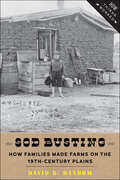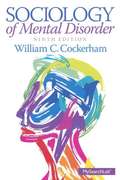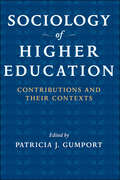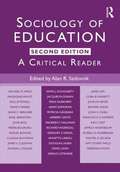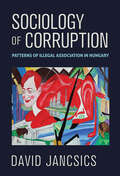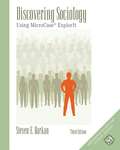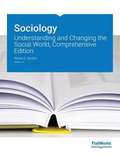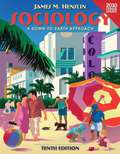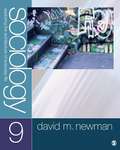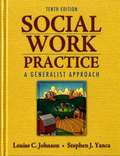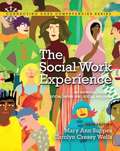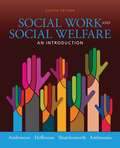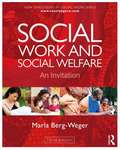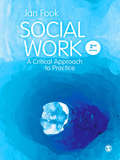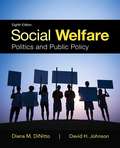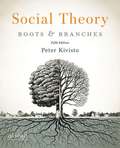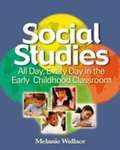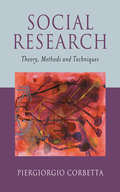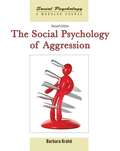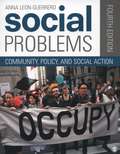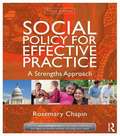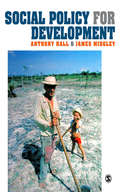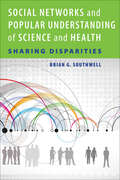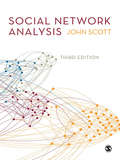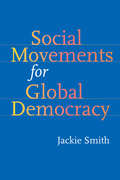- Table View
- List View
Sod Busting: How Families Made Farms on the Nineteenth-Century Plains (How Things Worked)
by David B. DanbomHow settlers transformed America’s most inhospitable frontier into an economic powerhousePrairie busting is central to the lore of westward expansion, but how was it actually accomplished with little more than animal and human power? In Sod Busting, David B. Danbom tells the story of Great Plains settlement in a way it has seldom been told before. Stretching beyond the sweeping accounts typical of standard textbooks, Danbom challenges students to think about the many practicalities of surviving on the Great Plains in the late nineteenth century by providing a detailed account of how settlers acquired land and made homes, farms, and communities. He examines the physical and climatic obstacles of the plains—perhaps America’s most inhospitable frontier—and shows how settlers sheltered themselves, gained access to fuel and water, and broke the land for agriculture. Treating the Great Plains as a post-industrial frontier, Danbom delves into the economic motivations of settlers, as well as the physically and economically difficult process of farm making. He explains how settlers got the capital they needed to succeed and how they used the labor of the entire family to survive until farms returned profits. He examines closely the business decisions that determined the success or failure of these farmers in a boom-and-bust economy; details the creation of churches, schools, and service centers that enriched the social and material lives of the settlers; and shows how the support of government, railroads, and other businesses contributed to the success of plains settlement.Based on contemporary accounts, settlers’ reminiscences, and the work of other historians, Sod Busting dives deeply into the practical realities of how things worked to make vivid one of the quintessentially American experiences, breaking new land.
Sociology of Mental Disorder (9th Edition)
by William C. CockerhamThis edition of book is includes the most recent literature and research on mental disorder including topics like DSM-5, examining socio-demographic factors, assessment of differences between male-female psychological distress etc.
Sociology of Higher Education: Contributions and Their Contexts
by Patricia J. GumportIn this volume, Patricia Gumport and other leading scholars examine the sociology of higher education as it has evolved since the publication of Burton Clark's foundational article in 1973. They trace diverse conceptual and empirical developments along several major lines of specialization and analyze the ways in which wider societal and institutional changes in higher education have influenced this vital field of study.In her own chapters, Gumport identifies the factors that constrain or facilitate the field's development, including different intellectual legacies and professional contexts for faculty in sociology and in education. She also considers prospects for the future legitimacy and vitality of the field.Featuring extensive reviews of the literature, this volume will be invaluable for scholars and students of sociology and higher education.
Sociology Of Education: A Critical Reader 2nd Ed
by Alan R. Sadovnik Ryan CoughlanThis comprehensive and bestselling Reader examines the most pressing topics in sociology and education while exposing students to examples of sociological research on schools. Drawing from classic and contemporary scholarship, noted sociologist Alan R. Sadovnik has chosen readings that examine current issues and reflect diverse theoretical approaches to studying the effects of schooling and society. The second edition provides students with seven new readings from some of the best theorists and researchers in education including James S. Coleman, Madeleine Arnot, and Claudia Buchman. Through full, rather than excerpted primary source readings, students have the opportunity to read sociological research as it is written and engage in critical analyses of readings in their entirety. Including comprehensive section introductions, questions for reflection and discussion, and suggested readings, Sociology of Education will stimulate student thinking about the important roles that schools play in contemporary society and their ability to solve fundamental social, economic and political problems.
Sociology of Corruption: Patterns of Illegal Association in Hungary
by David JancsicsIn Sociology of Corruption, David Jancsics provides a fresh approach to the study of corruption in Hungary, which once seemed to be the most likely of the ex-communist bloc nations to catch up to the West and is, according to many experts and scholars, a country with a highly corrupt dynamic.Based on data from 2022, Hungary is now the most corrupt member state of the European Union. There is also a consensus among experts that a small clique of corrupt political actors has captured most Hungarian state institutions and a significant portion of the business sector. What fostered corruption in Hungary? What are the most typical forms of corruption in this country? What do Hungarians think about it? What is the role of prime minister Viktor Orbán in this? Sociology of Corruption proposes a novel sociological theory of corruption focusing on social status and relationships, network structures, and power dynamics as important explanatory factors of corrupt behavior. Although his focus is on Hungary, Jancsics's findings are applicable to other nations and cultural contexts.
Sociology
by Steven E. BarkanThis best selling software-based workbook lets students explore dozens of sociological topics and issues, using data from the United States and around the world. With the workbook and accompanying ExplorIt software and data sets, students won't just read about what other sociologists have done, they will discover sociology for themselves. DISCOVERING SOCIOLOGY will add an exciting dimension to the introductory sociology course.
Sociology: Understanding and Changing the Social World
by Steven E. BarkanThe founders of sociology in the United States wanted to make a difference. A central aim of the sociologists of the Chicago school was to use sociological knowledge to achieve social reform. A related aim of sociologists like Jane Addams, W.E.B. DuBois, and Ida B. Wells-Barnett and others since was to use sociological knowledge to understand and alleviate gender, racial, and class inequality. It is no accident that many sociology instructors and students are first drawn to sociology because they want to learn a body of knowledge that could help them make a difference in the world at large. Steve Barkan's Sociology: Understanding and Changing the Social World is designed for this audience. It presents a sociological understanding of society but also a sociological perspective on how to change society, while maintaining the structure and contents of the best mainstream texts.
Sociology: A Down to Earth Approach 10th Ed
by James M. HenslinJames Henslin shares the excitement of sociology, with his acclaimed "down-to-earth" approach and personal writing style that highlight the sociology of everyday life and its relevance to students' lives. With wit, personal reflection, and illuminating examples, he shares with readers his passion for sociology. In addition to this trademark down-to-earth approach, other distinctive features include: Comparative perspectives. Two important themes are global comparisons - the diversity of social life across cultures and societies - and comparisons over time - what society used to be like, and how it has changed. The Globalization of Capitalism. Many examples highlight the ways in which our global economy influences the skills and knowledge we need, the work we do, and the cost of goods and services. Visual Presentations of Sociology. Outstanding maps, graphs, and photos grab students' interest and aid comprehension.
Sociology: Exploring the Architecture of Everyday Life (9th Edition)
by David M. NewmanThis text makes connections between sociology and current trends and events. Most chapters include a photo essay with b&w photos. Chapter learning features include suggestions for real-life activities and informal experiments, plus chapter key points and terms. The student website provides interactive study tools, readings, video and audio links, and journal articles. This ninth edition refers to recent political, historical, and cultural events and technology. Some statistical tables have been changed to more readable charts and graphs. The boxed features on sociologists at work and micro-macro connections have been updated. Newman is affiliated with DePauw University. Annotation ©2012 Book News, Inc. , Portland, OR (booknews. com)
Social Work Practice: A Generalist Approach (Tenth Edition)
by Louise C. Johnson Stephen J. YancaThis generalist social work practice text uses a strong theoretical framework for social work practice with diverse populations in both urban and rural settings. The authors blend ecosystems and client-centered empowerment to develop a model to working with diverse populations. By using this model, students will learn how to effectively work with diverse individuals, families, groups, organizations, and communities. The text incorporates CSWE requirements for learning the knowledge, skills, and values that are the foundation of social work practice at every level of practice.
The Social Work Experience: An Introduction to Social Work and Social Welfare (Sixth Edition)
by Mary Ann Suppes Carolyn Cressy WellsLearn how social workers use their professional expertise to assist people. This text is part of the Connecting Core Competencies Series. The Social Work Experience: An Introduction to Social Work and Social Welfare introduces students to the profession of social work including eight major fields of practice, and provides in-depth discussion of social welfare policy, its history, contemporary issues, and probable future trends. The book helps students understand how social workers use their professional expertise to assist people in solving a wide variety of problems to improve their lives. There are three major parts: The first part, Social Work and its Context, comprises four chapters which introduce the profession of social work, provide theoretical perspectives underlying generalist practice, investigate the concept of social justice, and explore social welfare policy and its history. The second part, Professional Practice Settings, offers an in-depth discussion of eight fields of practice: family and children's services, mental health, health care, schools, older adult services, criminal justice, and developmental disabilities. The third and final part, A Look to the Future, views the profession through the eyes of futurists and explores the challenges and opportunities that await new social workers. A better teaching and learning experience This program will provide a better teaching and learning experience-for you and your students. Here's how: Personalize Learning - MySearchLab delivers proven results in helping students succeed, provides engaging experiences that personalize learning, and comes from a trusted partner with educational expertise and a deep commitment to helping students and instructors achieve their goals. Improve Critical Thinking - Discussions on values, ethics, human diversity, and generalist social work practice throughout stimulate students to think critically about varying issues. Engage Students - Case studies introduce each chapter and are carefully developed to illustrate the myriad of problems that social workers deal with in daily practice. Explore Current Issues - Includes new content on a variety of issues, including policy diversity, the environment, and much more. Apply CSWE Core Competencies - The text integrates the 2008 CSWE EPAS, with critical thinking questions and practice tests to assess student understanding and development of competency. Support Instructors - An Instructor's Manual and Test Bank, Computerized Test Bank (MyTest), BlackBoard Test Item File, MySearchLab with Pearson eText, and PowerPoint presentations are included in the outstanding supplements package. Note: MySearchLab does not come automatically packaged with this text. To purchase MySearchLab, please visit: www.mysearchlab.com or you can purchase a valuepack of the text + MySearchLab (at no additional cost): ValuePack ISBN-10: 0205223095 / ValuePack ISBN-13: 9780205223091
Social Work and Social Welfare: An Introduction 8th Edition
by Rosalie Ambrosino Joseph Heffernan Guy Shuttlesworth Robert AmbrosinoIntegrating the latest accreditation standards and practices from the field, the eighth edition of bestselling SOCIAL WORK AND SOCIAL WELFARE gives readers a solid understanding of the social work profession and the role the profession plays in the social welfare system. In keeping with the current Council on Social Work Education's Educational Policy and Accreditation Standards, the book presents a generalist practice perspective in addressing social welfare issues within the context of the systems/ecological framework, the overarching framework used by generalist practitioners as they intervene to address social welfare needs at the individual, family, group, organization, community, and societal levels. Illustrating that there are many reasons why social problems occur, the book explores the history, values, and economic, political and cultural factors that surround these issues, as well as the attempts to solve or address them. Completely current, the eighth edition also includes updates on such key issues as health care, mental health, immigration, and criminal justice.
Social Work and Social Welfare: An Invitation
by Marla Berg-WegerSocial Work and Social Welfare: An Invitation is a nationally recognized, best-selling text and unique website for US Introductory Social Work and Social Welfare courses. It provides students with the knowledge, skills, and values that are essential for working with individuals, families, groups, organizations, communities, and public policy in a variety of practice settings.
Social Work
by Jan FookSocial work is a human profession founded on social justice. It is difficult however to negotiate this in the constantly-changing context of the twenty first century. Now in its' second edition, this book considers the critical tradition of social work and updates it with postmodern thinking. Jan Fook draws on critical reflection to help social workers deliver flexible, responsible and responsive practice and to celebrate the ageless ideals of the profession. Key ideas covered in the text include: - Postmodernism - Critical theories - Critical reflection - Contextuality The author draws on her own experiences, to relate theoretical ideas to real life. Summaries, exercises and further reading are also included in each chapter. The book will be essential reading for all undergraduate students of social work. It will also be a valuable resource for postgraduate students and qualified professionals, who want to revisit the critical tradition of social work.
Social Welfare: Politics And Public Policy
by Diana M. Dinitto David H. JohnsonAcknowledged as the most comprehensive, easy-to-read introduction to social welfare policy available, Social Welfare: Politics and Public Policy, 8/e, emphasizes the current political aspects of policy making and major social welfare programs, including public assistance, Social Security, disability, health insurance, child welfare, and much more. Social Welfare does more than describe the major social welfare policies and programs; it also tackles the conflict and controversies involved in the processes and outcomes of policy making. It contrasts rational and political approaches to policy making, policy analysis, policy implementation, and policy evaluation. The authors present conflicting perspectives, encouraging students to think critically, to debate, and to consider their own views on issues.
Social Theory: Roots And Branches (Fifth Edition)
by Peter KivistoEdited by Peter Kivisto, this acclaimed collection of accessible primary source readings enables students to experience "firsthand" a wide range of perspectives that are shaping current sociological theory. Now in its fifth edition, Social Theory: Roots and Branches covers both classical theory (the roots) and contemporary theory (the branches) and shows how they are linked. Part One features work from such well-known classical theorists as Marx, Durkheim, Weber, and Simmel. It also presents selections by theorists outside of the discipline and from writers who are often overlooked in competing collections, including W. E. B. Du Bois, Charlotte Perkins Gilman, and Harriet Martineau. Part Two offers readings that illustrate major contemporary theoretical approaches, ending with a section on cutting-edge directions in theoretical discourse. Now featuring a revised and expanded introductory chapter, this fifth edition offers seventeen new readings, including eight by theorists who are new to this collection.
Social Studies: All Day, Every Day in the Early Childhood Classroom
by Melanie WallaceSocial Studies - All Day, Every Day, is a research based text containing the latest research on learning styles, reading and math, and best practices. In light of the recent No Child Left Behind legislation, many teachers of young children are opting out of teaching social studies in favor of spending more time on reading and math instruction. Not only is this inappropriate and unfair to the students, it is unnecessary. In this text, the reader will discover ways to study in-depth, a wide range of the social studies, while spending the necessary time and intellectual energy developing reading and mathematical skills. The opening chapters of the text define the social studies and describe the National Council of Social Studies (NCSS) standards as they relate to teaching young children. The remainder of the text breaks down teaching methodology for working with young children and the social studies, and looking at individual disciplines within the social studies. Practical application, with a theoretical base, is the key to this text.
Social Research: Theory, Methods and Techniques
by Piergiorgio Corbetta`This is an impressively detailed, clearly written book.... It is a book that I would like students to read' - Clive Seale, Goldsmiths College, London Social Research: Theory, Methods and Techniques presents an understanding of social research practice through appreciation of its foundations and methods. Stretching from the philosophy of science to detailed descriptions of both qualitative and quantitative techniques, it illustrates not only `how' to do social research, but also `why' particular techniques are used today. The book is divided into three parts: Part One: Illustrates the two basic paradigms - quantitative and qualitative - of social research, describing their origins in philosophical thought and outlining their current interpretations. Part Two: Devoted to quantitative research, and discusses the relationship between theory and research practice. It also presents a discussion of key quantitative research techniques. Part Three: Examines qualitative research. Topics range from classical qualitative techniques such as participant observation, to more recent developments such as ethnomethodological studies. Overall, the author offers an engaging contribution to the field of social research and this book is a reminder of the solid foundations upon which most social research is conducted today. As a consequence it will be required reading for students throughout the social sciences, and at various levels.
The Social Psychology of Aggression (Second Edition)
by Barbara KrahéThe second edition of this textbook provides a thoroughly revised, updated and expanded overview of social psychological research on aggression. The first part of the book covers the definition and measurement of aggression, presents major theories and examines the development of aggression. It also covers the role of situational factors in eliciting aggression, and the impact of using violent media. The second part of the book focuses on specific forms and manifestations of aggression. It includes chapters on aggression in everyday life, sexual aggression and domestic violence against children, intimate partners and elders. There are two new chapters in this part addressing intergroup aggression and terrorism. The concluding chapter explores strategies for reducing and preventing aggression. The book will be essential reading for students and researchers in psychology and related disciplines. It will also be of interest to practitioners working with aggressive individuals and groups, and to policy makers dealing with aggression as a social problem.
Social Problems: Community, Policy, and Social Action Fourth Edition
by Anna Y. Leon-GuerreroThe approach offered by this book is threefold: 1. ) to humanize the social problems with voices of experience, i.e. the poverty stricken, to the voices of change, i.e. the social workers, policy makers, student community volunteers; 2. ) each chapter will address the consequences and responses to a social problem; 3. ) to provide an effective platform for discussion thru the use of boxed features, learning checks integrated into chapter presentations, discussion questions, and the use of a limited virtual classroom on a companion website. The hallmarks of the book will be its integrated theme of race, class, and gender; emphasis on 'service learning' (which focuses on student awareness of effective community responses to social problems); critical thinking and active learning thru the text presentation and pedagogy to go beyond the often disheartening parade of social problems; and the use of the internet and unique print supplements to expand on what is intended to be a briefer book than most. The book is intended to have a strong U. S. focus with a global perspective interwoven where appropriate. Social Problems offers the following unique features and benefits: Voices in the Community a section in each chapter offering testimony from those experiencing or doing something about social problems Visual Essays in each section to highlight a particular social problem or solution in the context of actual family and individual experiences. Chapters will have photos interspersed. Internet and community exercises at the end of each chapter to present the opportunity for further research and to give students a chance to explore chapter concepts in a direct way in the community What Does it Mean to Me? A feature intended to bring the analysis of the problem being studied down to the level of the individual. Inclusion of four theoretical perspectives for each problem studied: conflict, social interactionist, functionalist and feminist perspectives End of chapter Community, Policy and Social Action sections focus on social policy, advocacy, and community innovation in response to social problems. This feature encourages students to examine and become a part of their own community. This is a unique, service learning-oriented benefit taking students out of the classroom, away from their texts, and into their community. Podcasts recorded by the author for each chapter reviews concepts and focuses on a specific case study.
Social Policy for Effective Practice
by Rosemary ChapinFor use as a text in foundations generalist social policy courses, either at the baccalaureate or master's level, this book examines the process of defining need, analyzing social policy, and developing new policy. A clear philosophical base and a common theoretical framework underlie the discussion of each component of the policy process. Four themes are interwoven throughout the book: the importance of thinking critically about social policy, the benefits of using the strengths perspective in policy analysis and development, the critical role social policy plays in all areas of practice, and the absolute responsibility of every social worker to engage in policy practice. Routledgesw.com now contains 6 cases; the Sanchez Case has been revised to include much more policy content. Instructor materials include extra readings, PowerPoints, test questions, annotated links, syllabi, and EPAS guidelines. The book is also customizable on Routledge Custom Gateway.
Social Policy for Development
by James Midgley Anthony Hall'Strong social policy is essential for sustainable growth. This book is an extremely useful overview of social policy issue for policy makers and anyone who wants to understand the true roots of successful sustainable development' - Ian Johnson, Vice President for Sustainable Development, The World Bank 'Throughout the world issues of social development have now taken centre stage. There is no more comprehensive and readable guide to the choices and conflicts of this global drama. This book is essential reading for all students and practitioners of social development - and for every World Bank economist' - David Piachaud, Professor of Social Policy, London School of Economics This much-needed textbook fulfils a major gap in providing a complete up-to-date guide and introduction to the increasingly important role of social policy in the context of development processes and practice. Across a number of key sectors and areas of social policy concern, the authors accessibly introduce and explain the main conceptual debates, the most recent policy discussions, and provide applied examples to illustrate the latest developments in the social policy and planning field. Central topics covered include: - poverty - rural development - urban development - education - health - social work - social welfare - international development and cooperation. Social Policy for Development is an essential text for all students and practitioners alike seeking a deeper understanding of the issues of poverty, social exclusion and deprivation across social policy and development studies internationally.
Social Networks and Popular Understanding of Science and Health: Sharing Disparities
by Brian G. SouthwellA data-driven analysis of how different people share information about health through social media.Using social media and peer-to-peer networks to teach people about science and health may seem like an obvious strategy. Yet recent research suggests that systematic reliance on social networks may be a recipe for inequity. People are not consistently inclined to share information with others around them, and many people are constrained by factors outside of their immediate control. Ironically, the highly social nature of humankind complicates the extent to which we can live in a society united solely by electronic media.Stretching well beyond social media, this book documents disparate tendencies in the ways people learn and share information about health and science. By reviewing a wide array of existing research—ranging from a survey of New Orleans residents in the weeks after Hurricane Katrina to analysis of Twitter posts related to H1N1 to a physician-led communication campaign explaining the benefits of vaginal birth—Brian G. Southwell explains why some types of information are more likely to be shared than others and how some people never get exposed to seemingly widely available information.This book will appeal to social science students and citizens interested in the role of social networks in information diffusion and yet it also serves as a cautionary tale for communication practitioners and policymakers interested in leveraging social ties as an inexpensive method to spread information.
Social Network Analysis (Third Edition)
by John ScottThe Third Edition of this best-selling text has been fully revised and updated to include coverage of the many developments on social network analysis (SNA) over the last decade. Written in a clear and accessible style, the book introduces these topics to newcomers and non-specialists and gives sufficient detail for more advanced users of social network analysis. Throughout the book, key ideas are discussed in relation to the principal software programs available for SNA. The book provides a comprehensive overview of the field, outlining both its theoretical basis and its key techniques. Drawing from the core ideas of points, lines and paths, John Scott builds a framework of network analysis that covers such measures as density, centrality, clustering, centralisation, and spatialisation. He identifies the various types of clique, component, and circle into which networks are formed, and he outlines an approach to socially structured positions within networks. A completely new chapter in this edition discusses recent work on network dynamics and methods for studying change over time. A final chapter discusses approaches to network visualisation. This is an excellent resource for researchers across the social sciences and for students of social theory and research methods.
Social Movements for Global Democracy (Themes in Global Social Change)
by Jackie SmithHonorable Mention, 2010 Book Award, Global Division, Society for the Study of Social ProblemsHonorable Mention, 2010 PEWS Book Award, Political Economy of the World-System section of the American Sociological AssociationThis groundbreaking study sheds new light on the struggle to define the course of globalization. Synthesizing extensive research on transnational activism, Social Movements for Global Democracy shows how transnational networks of social movement activists—democratic globalizers—have worked to promote human rights and ecological sustainability over the predominant neoliberal system of economic integration.Using case studies of recent and ongoing campaigns for global justice, Jackie Smith provides valuable insight into whether and how these activists are succeeding. She argues that democratic globalizers could be more effective if they presented a united front organized around a global vision that places human rights and ecological stability foremost and if they were to directly engage governments and the United Nations.Illuminating the deep-seated struggles between two visions of globalization, Smith reveals a network of activists who have long been working to democratize the global political system.
